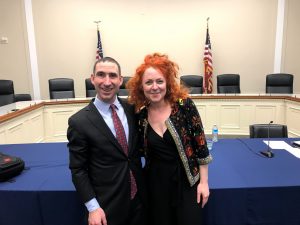On Tuesday, May 29, Music Canada’s President and CEO, Graham Henderson, appeared before the Standing Committee on Canadian Heritage as they heard testimony from witnesses on remuneration models for artists and creative industries. The study is part of the five-year statutory review of the Canadian Copyright Act.
Music Canada’s President & CEO @GFHenderson will appear before the Standing Committee on Canadian Heritage this morning as they study remuneration models for artists & creative industries as part of the Copyright Act review. Listen live at 8:45am EST: https://t.co/IYyBSpd4TZ
— Music Canada (@Music_Canada) May 29, 2018
Henderson joined Dominic Trudel, Chief Executive Officer of the Conseil québécois de la musique, and Andrew Morrison of The Jerry Cans for the first session of the day, which took place from 8:45am – 9:45am. An archived audio recording of the meeting is available on the House of Commons website and the full text of Henderson’s testimony has been published on the Music Canada website. The meeting featured testimonies from the three witnesses as well as a Q&A period, where Committee Members posed questions to the witnesses.
A selection of quotes from the meeting is included below. Any translations have been taken directly from the House of Commons audio archive.
Dominic Trudel, Chief Executive Officer of the Conseil québécois de la musique
“The promise of the digital era was that it would eliminate intermediaries in the distribution and production chain and directly link creators to their fans. Others said we would achieve a golden age of stage performances that would supersede the sales of sound recordings as a motor of the industry. All of these promises have not borne fruit and there are still problems in transforming digital content into significant revenue.” – Trudel quoting Guillaume Sirois’ report Le développement de contenus numériques dans le domaine de la musique de concert.
“Although the application of copyright and the payment of royalties in the digital era remain a main issue for the remuneration of musicians, digital change has also had a significant impact on their ability to produce, broadcast and promote music. The pay of creators is therefore affected throughout the process.”
“New methods of consuming music are almost exclusively designed for popular music and are poorly tailored to the realities of classical music. This can impact composers, musicians and a number of different components of the classical domain.”
Andrew Morrison, The Jerry Cans
“We incorporate throat singing and we are very weary now because throat singing is now becoming an internationally-known art form with Tanya Tagaq and her collaborations and with The Jerry Cans and a few other artists. But we wonder how that kind of relates and how that throat singing can be used and how traditional art forms should be protected and should be ensured that they’re compensated when they’re being performed on international scales.”
“Songs that we make and songs that we produce – it’s such a small part of our income generation – and I think that’s because of what’s happening in the copyright world. We’re losing such control and such power over our own music and our own creative forms. And we’re very confused, I think, about what to do about it, cause we feel a bit powerless about where our money’s coming from.”
“I am hopeful that we can figure out a way, because I do think that we’ve toured with some international artists and they see Canada as a very special place and they think that the support for music in this country is very strong and we need to keep it that way. But I also think we need to figure out how to more properly compensate artists for their music specifically, because touring is TIRING as you can see.”
“I do think it’s important to present the artist’s perspective. Sometimes I think that we get lost in the conversations because these things are quite complex and we struggle to understand the world of copyright. I think that there’s lots to be done and when Graham was talking about middle class artists I was like ‘I want to be one of those.’ (laughs) If we had a pie chart out…our revenue, what comes from copyright, is so little now. And that’s young artists. The older generation is telling me of the glory days of getting royalty cheques and I say ‘sweet, what’s that? I’ll buy you a coffee with mine.’ I do think there’s potential to figure it out…”



Music Canada